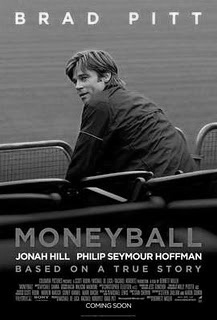
Sports movies have become cliché over the past 25 years with stories of underdog players or teams coming together to win the big game. In this fall’s sports movie representative, Moneyball, the cookie-cutter plotline is not the case.
However, the adversity that the characters must face is still prominent.
The story revolves around Oakland Athletics general manager, Billy Beane, played in the film by Brad Pitt. Beane has faced his fair share of difficult, life-changing decisions throughout his life and the film does a great job showing the thought process that he had to go through in making them.
As a teenager, Beane was a top baseball prospect and was offered a hefty, first round contract by the New York Mets while also pondering a joint football-baseball scholarship to Stanford University. After much deliberation, Beane took the Mets offer and started his career in Major League Baseball.
Though his playing career would be short-lived and filled with disappointment, Beane worked his way up through the ranks to eventually become general manager of the Oakland A’s, with the lowest salary in baseball. In order to be competitive, he must find a way to acquire top talent for a bargain.
In the film, Peter Brand, played by Jonah Hill, is the mastermind behind the new form of player development and analysis through the use of sabremetrics. Based on the writings of baseball brain Bill James, sabremetrics uses player’s statistics to predict the amount of wins a team will have in a given season.
Brand is based off Paul DePodesta, the current director of player development for the New York Mets, who preferred going un-credited in the film. The film pulls at many different aspects of the heart and mind. Glances of Beane’s relationship with his daughter, Casey, who he shares a special bond with and is a major motivator for him, provide a more tender side to Beane, who is often seen in a louder, more competitive light.
Scenes with Beane and his scouts showed the working environment that a Major League Baseball general manager faces on a day-to-day basis. His snarky comments and his scouts’ responses are sure to entertain.
One aspect that I found moving was the use of highlights and a reenactment of one of the A’s biggest games of the season, a walk-off win by Scott Hatteberg. It gave perspective on the actual team and the odds that they overcame to maintain the longest win streak in American League history at 20 games.
Though the A’s don’t win the big game, they set the standard of how baseball can be won. Two years later, the Boston Red Sox would win the 2004 World Series using similar techniques that the A’s had implemented.
If you are a baseball fan, who enjoys the essence of the game, then Moneyball will not disappoint. It is so good that within the next few years it may be in serious talks of an all-time great baseball movie. And that sure is saying something.






Comments